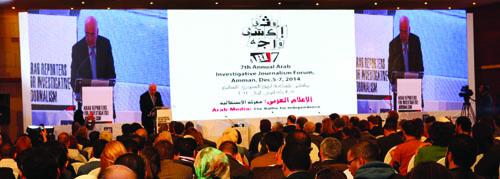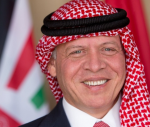You are here
Former foreign minister calls for inclusive ‘Arab awakening’
By Afaf Khoshman - Apr 15,2014 - Last updated at Apr 15,2014
AMMAN — Future generations need to seize the opportunity the Arab Spring has offered to entrench respect of diversity and pluralism in their societies, former foreign minister Marwan Muasher said.
Speaking at a seminar organised by the Abdel Hamid Shoman Foundation on Monday and moderated by former premier Abdel Karim Kabariti, he said stability in the Arab region cannot be achieved in only three years.
“It is through diligence and hard work that a culture which respects and celebrates diversity flourishes, along with institutions that can protect this diversity and safeguard the people’s right to be part of organised and peaceful action,” noted Muasher, who is vice president of studies at the Washington-based Carnegie Endowment for International Peace.
Introducing his new book “The Second Arab Awakening and Battle for Pluralism”, released earlier this year, he noted that the Arab world witnessed an intellectual awakening in the early 20th century that was later transformed into movements which fought against foreign colonisation.
The second Arab awakening, the Arab Spring, was launched by popular movements that were not intellectually framed.
“The recent popular revolutions were specific in terms of identifying their enemy, including totalitarian regimes; however, they could not reach a definition of the identity of their newly formed societies,” Muasher elaborated.
He presented an overview of the various models that the current transitions taking place in the region have introduced.
The first is the “diversity” model as in the case of Tunisia, where a consensus government was inclusive of diverse political and religious currents.
Meanwhile, a model that depends on elimination of the other was also introduced in the Arab world, mainly adopted by religious and civil forces in Egypt.
“In this model, forces act as if being in power entitles them to impose what they want on the entire society; it is a monopoly of the truth,” Muasher noted.
The third is the Syrian model, where the regime sees no harm in killing people using any means to guarantee it stays in power in the face of a disorganised opposition; while the fourth model is embodied in a group of countries that have avoided the Arab Spring by adopting sporadic and unplanned reforms without a clear vision.
Muasher, who led the National Agenda steering committee — formed in 2005 to map out the country’s 10-year reform plan — said there is a valuable opportunity in Jordan to progress gradually towards reform, given the fact that all political groups have consensus on the Monarchy.
“In Jordan, the Monarchy is an integral part of power, unlike what the Western model suggests.”
Criticising the current Elections Law, he said it does not represent the will of the Jordanian people, noting that the 1989 law enabled entire political groups to take part in the decision-making process.
“Despite the economic hardships during the late 1980s, Jordanians did not take to the streets in demonstrations the way they are doing it today; people felt they are part of the public and political life back then.”
Under the 1989 elections law, each person could vote for five district candidates, while in the current law, each voter is given two votes — one at the district level and another at the national level for a closed list.
Charging that the Palestinian-Israeli conflict has been used as a pretext to delay reforms in Jordan, Muasher said democratisation should involve all components of society, including the Muslim Brotherhood.
“The moment I allow for the elimination of the other, the other will work to exclude me as well,” he stressed, adding that both civil and religious powers have sought to monopolise power, not only the Islamists.
“I don’t agree with the Islamists, but I think they are entitled to be present on the political arena,” Muasher said.
Responding to questions asked by an audience of former premiers, ministers, activists and media professionals, Muasher denied reports that he plans to establish a party in Jordan.
“My idea is that we need to reach out to the grass roots and promote this [reform] approach over the next 15 or 20 years to truly allow for the younger generation to be part of change.”
He called on Arab societies to avoid the consequences of the first Arab awakening, which resulted in replacing foreign dictators with local totalitarian regimes.
“This is our battle, not one party against another, but a battle to entrench the sustainability of diversity for everyone; no religious, intellectual or political dictatorship is allowed, let’s not deviate from the path once again,” Muasher concluded.
Related Articles
AMMAN — Countries in the region urgently need to embrace new social contracts that shape the relationship between peoples and governments, b
Media freedoms have declined four years after the “Arab awakening”, not only in the countries that witnessed revolutions but others as well, a former minister and commentator said on Saturday.
The lack of an education system that promotes critical thinking and respecting other opinions has created a “depressed” generation that does not feel social equality and so develops positive views of groups like the Islamic State, according to a former foreign minister.















